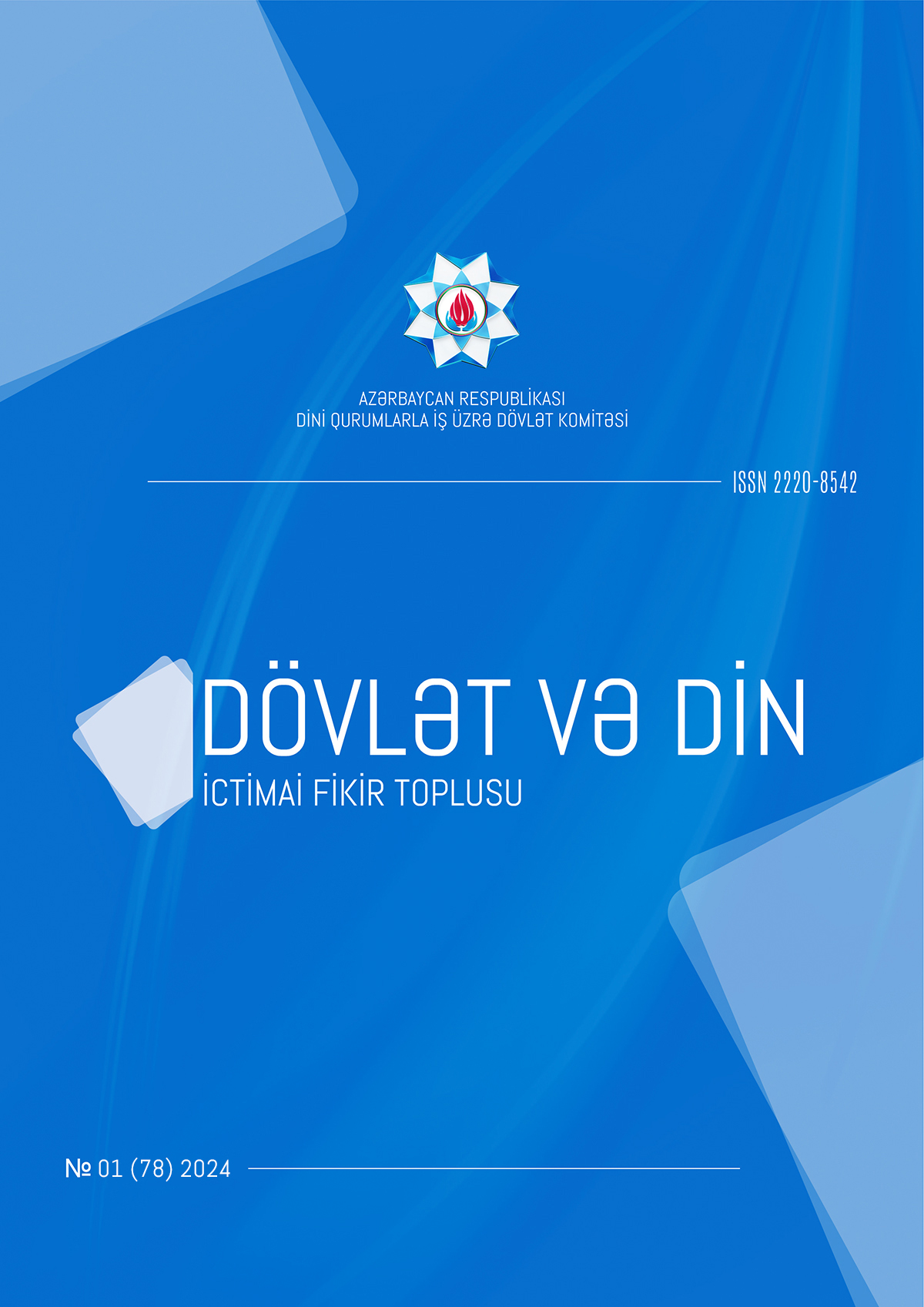ÇAĞDAŞ BATI DÜŞÜNCESİNDE FELSEFİ ESKATOLOJİ: İMMANUEL KANT’IN AHLAK FELSEFESİ ÇERÇEVESİNDE BİR DEĞERLENDİRME
Ülkər Abuzarova | ulkerabuzarova@ait.edu.az
Azerbaycan İlahiyat Enstitüsü, ilahiyat üzre felsefe doktoruAraşdırma
XÜLASƏ
Çağdaş Batı düşüncesinde ölümden sonraki yaşamla ilgili en fazla tartışılan argümanlar
arasında Alman filozof İmmanuel Kant’ın (1724-1804) ahlak delili çerçevesinde değerlendirilen ruhun
erdeme ulaşması ve en yüksek iyinin gerçekleştirilmesi delilinin önemli yeri bulunmaktadır. Teoloji
eskatolojinin delillerinden farklı olarak Kant’ın bu delili, nihâî gayenin sonsuz mutluluk olduğu ve
ruhun ölümsüzlüğü görüşleri ile birlikte ölümden sonraki hayatla ilgili felsefi eskatolojinin sınırlarını
oluşturmaktadır. Bu makalede Kant’ın en yüksek iyiynin gerçekleştirilmesi ve ruhun erdeme ulaşması delilini
temellendirirken üzerinde durduğu hususlar ve kendisine yöneltilen eleştiriler değerlendirilmektedir
ƏDƏBİYYAT
1. Michael Peterson (and others). Reason and Religious Belief: An Introduction to the Philosophy of
Religion. New York: Oxford University Press, 1991.
2. Immanuel Kant. Immanuel Kant’s Critique of Pure Reason (ed. Norman Kemp Smith). Hampshire:
The Macmillan Co., 1988.
3. Yeager Hudson. The Philosophy of Religion. California: Mayfield Publishing Co., 1990.
4. Philip L. Quinn and Charles Taliaferro. A Companion to Philosophy of Religion. Malden:
Blackwell Publishers, 2005.
5. Immanuel Kant. Critique of Practical Reason (ed. Lewis White Beck). New Jersey: Prentice Hall
Inc., 1993.
6. D. Z. Philips and Timothy Tessin. Kant and Kierkegaard on Religon. London: Macmillan Press
Ltd, 2000.
7. Brian Davies. An Introduction to the Philosophy of Religion. Oxford: Oxford University Press,
1993.
8. Anthony Flew. “Immortality”, The Encyclopedia of Philosophy (ed. Paul Edwards). New York:
Macmillan, 1942, II, 139-150.
9. Aydın, Mehmet S. Kant’ta ve Çağdaş İngiliz Felsefesinde Tanrı-Ahlak İlişkisi. Ankara: Umran
Yayınları, 1981.
10. Immanuel Kant. Lectures on Ethics (çev.: Louis Infield). Indianapolis: Hackett Publishing
Company, 1980.
11. Immanuel Kant. Critique of Judgment (çev.: Werner S.Pluhar). Indianapolis: Hackett PublishinCompany, 1987.
12. Immanuel Kant. Groundwork of the Metaphysic of Morals (çev.: H.J.Paton). New York:
Harper Torchbook, 1964.
13. David A.Paulin. Groundwork of Philosophy of Religion. London: Epworth Press, 1989.
14. Charlie Dunbar Broad. Mind and It’s Place in Nature. Cambridg: 1925.
15. Joseph Runzo. Global Philosophy of Religion. Oxford: Oneworld, 2001.
16. Geddes MacGregor. Philosophical Issues in Religious Thought. Washington: Houghton
Mifflin, 1972
PHILOSOPHICAL ESCHATOLOGY IN CONTEMPORARY WESTERN THOUGHT: AN EVALUATION WITHIN THE FRAMEWORK OF IMMANUEL KANT’S MORAL PHILOSOPHY
Ulkar Abuzarova | ulkerabuzarova@ait.edu.az
Azerbaycan İlahiyat Enstitüsü, ilahiyat üzre felsefe doktoruResearch
SUMMARY
Among the most discussed arguments related to life after death in contemporary
Western thought, the argument of the soul’s achievement of virtue and understanding of the highest
good, evaluated within the framework of the moral argument of the German philosopher Immanuel
Kant (1724-1804), is of great importance. Unlike the arguments of theological eschatology, Kant’s
argument, together with his views on eternal happiness and the immortality of the soul, constitute the
limits of philosophical eschatology about life after death. In this article, the points emphasized by Kant
in his argument about the realization of the highest good and the soul’s achievement of virtue and the
criticisms addressed to him are analyzed
REFERENCE LIST
1. Michael Peterson (and others). Reason and Religious Belief: An Introduction to the Philosophy of
Religion. New York: Oxford University Press, 1991.
2. Immanuel Kant. Immanuel Kant’s Critique of Pure Reason (ed. Norman Kemp Smith). Hampshire:
The Macmillan Co., 1988.
3. Yeager Hudson. The Philosophy of Religion. California: Mayfield Publishing Co., 1990.
4. Philip L. Quinn and Charles Taliaferro. A Companion to Philosophy of Religion. Malden:
Blackwell Publishers, 2005.
5. Immanuel Kant. Critique of Practical Reason (ed. Lewis White Beck). New Jersey: Prentice Hall
Inc., 1993.
6. D. Z. Philips and Timothy Tessin. Kant and Kierkegaard on Religon. London: Macmillan Press
Ltd, 2000.
7. Brian Davies. An Introduction to the Philosophy of Religion. Oxford: Oxford University Press,
1993.
8. Anthony Flew. “Immortality”, The Encyclopedia of Philosophy (ed. Paul Edwards). New York:
Macmillan, 1942, II, 139-150.
9. Aydın, Mehmet S. Kant’ta ve Çağdaş İngiliz Felsefesinde Tanrı-Ahlak İlişkisi. Ankara: Umran
Yayınları, 1981.
10. Immanuel Kant. Lectures on Ethics (çev.: Louis Infield). Indianapolis: Hackett Publishing
Company, 1980.
11. Immanuel Kant. Critique of Judgment (çev.: Werner S.Pluhar). Indianapolis: Hackett PublishinCompany, 1987.
12. Immanuel Kant. Groundwork of the Metaphysic of Morals (çev.: H.J.Paton). New York:
Harper Torchbook, 1964.
13. David A.Paulin. Groundwork of Philosophy of Religion. London: Epworth Press, 1989.
14. Charlie Dunbar Broad. Mind and It’s Place in Nature. Cambridg: 1925.
15. Joseph Runzo. Global Philosophy of Religion. Oxford: Oneworld, 2001.
16. Geddes MacGregor. Philosophical Issues in Religious Thought. Washington: Houghton
Mifflin, 1972
ФИЛОСОФСКАЯ ЭСХАТОЛОГИЯ В СОВРЕМЕННОЙ ЗАПАДНОЙ МЫСЛИ: ОЦЕНКА В РАМКАХ МОРАЛЬНОЙ ФИЛОСОФИИ ИММАНУИЛА КАНТА
Улькар Абузарова | ulkerabuzarova@ait.edu.az
Azerbaycan İlahiyat Enstitüsü, ilahiyat üzre felsefe doktoruИсследование
РЕЗЮМЕ
К числу наиболее обсуждаемых аргументов о жизни после смерти в современной
западной мысли относится аргумент немецкого философа Иммануила Канта (1724-1804)
о достижении добродетели и реализации высшего блага, который оценивается в рамках
морального аргумента. В отличие от рассуждений теологической эсхатологии, аргументация
Канта вместе с его взглядами на вечное счастье и бессмертие души составляют пределы
философской эсхатологии о жизни после смерти. В этой статье оцениваются моменты, которые
подчеркивает Кант, обосновывая доказательства реализации высшего блага и достижения
душой добродетели; а также критика, направленная в его адрес по этому аргументу
ЛИТЕРАТУРА
1. Michael Peterson (and others). Reason and Religious Belief: An Introduction to the Philosophy of
Religion. New York: Oxford University Press, 1991.
2. Immanuel Kant. Immanuel Kant’s Critique of Pure Reason (ed. Norman Kemp Smith). Hampshire:
The Macmillan Co., 1988.
3. Yeager Hudson. The Philosophy of Religion. California: Mayfield Publishing Co., 1990.
4. Philip L. Quinn and Charles Taliaferro. A Companion to Philosophy of Religion. Malden:
Blackwell Publishers, 2005.
5. Immanuel Kant. Critique of Practical Reason (ed. Lewis White Beck). New Jersey: Prentice Hall
Inc., 1993.
6. D. Z. Philips and Timothy Tessin. Kant and Kierkegaard on Religon. London: Macmillan Press
Ltd, 2000.
7. Brian Davies. An Introduction to the Philosophy of Religion. Oxford: Oxford University Press,
1993.
8. Anthony Flew. “Immortality”, The Encyclopedia of Philosophy (ed. Paul Edwards). New York:
Macmillan, 1942, II, 139-150.
9. Aydın, Mehmet S. Kant’ta ve Çağdaş İngiliz Felsefesinde Tanrı-Ahlak İlişkisi. Ankara: Umran
Yayınları, 1981.
10. Immanuel Kant. Lectures on Ethics (çev.: Louis Infield). Indianapolis: Hackett Publishing
Company, 1980.
11. Immanuel Kant. Critique of Judgment (çev.: Werner S.Pluhar). Indianapolis: Hackett PublishinCompany, 1987.
12. Immanuel Kant. Groundwork of the Metaphysic of Morals (çev.: H.J.Paton). New York:
Harper Torchbook, 1964.
13. David A.Paulin. Groundwork of Philosophy of Religion. London: Epworth Press, 1989.
14. Charlie Dunbar Broad. Mind and It’s Place in Nature. Cambridg: 1925.
15. Joseph Runzo. Global Philosophy of Religion. Oxford: Oneworld, 2001.
16. Geddes MacGregor. Philosophical Issues in Religious Thought. Washington: Houghton
Mifflin, 1972




